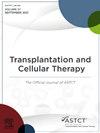Integrating Social Work Throughout the Hematopoietic Cell Transplantation Trajectory to Improve Patient and Caregiver Outcomes
IF 4.4
3区 医学
Q2 HEMATOLOGY
引用次数: 0
Abstract
Clinical social workers possess a dual skillset of social care and mental health care and are the largest group of psychosocial care providers in oncology. Psychosocial care is an integral component of quality healthcare. The prevailing model of psychosocial care in oncology is a brief consultation for patients who screen positive for distress at a particular timepoint. This model is insufficient for hematopoietic cell transplantation (HCT). Patients and caregivers have evolving needs throughout the HCT process, and psychosocial care models should meet these needs. This white paper, a collaboration between the Association of Oncology Social Work's Blood Cancer/HCT Special Interest Group and the American Society for Transplantation and Cellular Therapy's Social Work Special Interest Group, presents a gold standard model for the integration of social work in HCT. The model structures social work visits in every phase of HCT and integrates social workers within the interdisciplinary team. In this model, social workers conduct assessments with all patients (autologous and allogeneic) at the initial HCT consultation and again during work-up. They subsequently follow all patients and caregivers as they progress through transplant. This ongoing management reduces the burden on other team members to identify and address psychosocial needs. It also creates many organic opportunities to implement interventions to improve outcomes. There is a need to build institutional capacity for psychosocial care. Strategies that centers can use to build capacity are presented. As a complex clinical intervention, the gold standard model is well-suited for implementation research within a quality improvement framework.
在整个造血细胞移植过程中整合社会工作以改善患者和护理人员的预后。
临床社会工作者拥有社会护理和精神保健的双重技能,是肿瘤学中最大的社会心理护理提供者群体。心理社会护理是优质保健的一个组成部分。肿瘤社会心理护理的主流模式是对在特定时间点筛查为痛苦阳性的患者进行简短咨询。这种模型对于造血细胞移植(HCT)来说是不够的。在整个HCT过程中,患者和护理人员的需求不断变化,心理社会护理模式应满足这些需求。这份白皮书由肿瘤社会工作协会的血癌/HCT特别兴趣小组和美国移植和细胞治疗协会的社会工作特别兴趣小组合作,提出了社会工作在HCT中的整合的黄金标准模型。该模式在HCT的每个阶段都安排了社会工作访问,并将社会工作者纳入跨学科团队。在这个模型中,社会工作者在最初的HCT咨询和检查期间对所有患者(自体和异体)进行评估。随后,他们在移植过程中跟踪所有患者和护理人员。这种持续的管理减轻了其他团队成员识别和处理心理社会需求的负担。它还为实施干预措施以改善结果创造了许多有机机会。有必要建立社会心理护理的机构能力。介绍了中心可以用来建立能力的策略。作为一种复杂的临床干预,金标准模型非常适合在质量改进框架内进行实施研究。
本文章由计算机程序翻译,如有差异,请以英文原文为准。
求助全文
约1分钟内获得全文
求助全文
来源期刊

Transplantation and Cellular Therapy
Medicine-Hematology
CiteScore
7.00
自引率
15.60%
发文量
1061
审稿时长
51 days
 求助内容:
求助内容: 应助结果提醒方式:
应助结果提醒方式:


